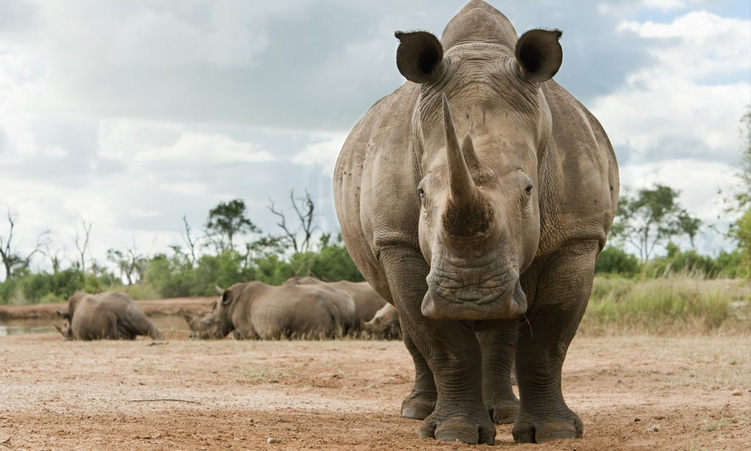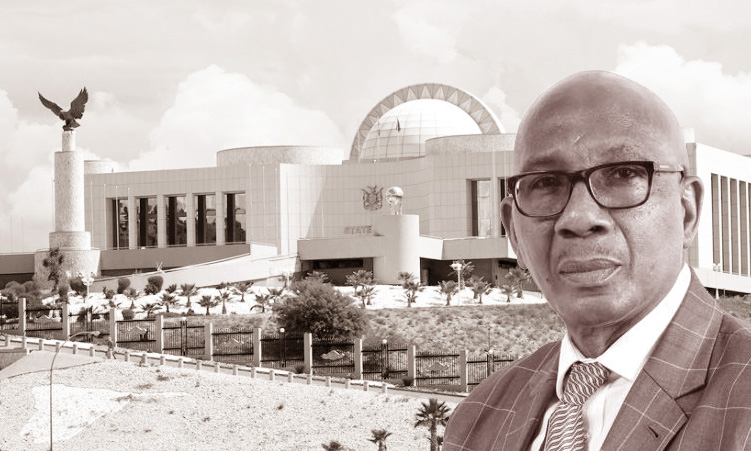ALTHOUGH it is widely believed that organic farming is environmentally friendly and its produce much healthier than if chemicals are used, some Namibians do not think it can satisfy the country’s food needs.
Organic produce are considered healthy because this method of farming does not use artificial fertilisers, pesticides or growth accelerators, which could be harmful to the environment. Instead, organic farmers use natural compost and manure fertilisers on their fields.Other organic methods include crop rotation and mechanical cultivation to maintain soil productivity and control weeds, insects and other pests.So, is this the way all Namibian farmers should go? The President of the Namibia Agricultural Union (NAU), Raimar Von Hase, seems sceptical about organic farming.”Organic farming is very complicated.It needs to be looked at very carefully.It is costly and cumbersome,” says Von Hase.But Manjo Smith of Greenspot Organics, an organic farm of 4,6 hectares outside Okahandja, is a big enthusiast of organic farming.She believes it’s the way to go.Smith grows organic vegetables, herbs and cut flowers.She says organic farming produces high quality, nutritional food, adding that research has proven a vast nutritional difference between organic food and chemically grown food.”The best way of reducing your exposure to potentially harmful pesticides is to eat organically grown food, where their use is avoided,” says Smith.Her vegetables, herbs, eggs and honey are sold in major shopping outlets in Windhoek such as Fruit and Veg City, Maerua Super Spar and Pick & Pay, while her flowers go to florists countrywide.The main downside for the consumer is that organic produce generally costs more than crops grown using conventional farming methods.Smith said industrial agriculture, where chemicals are used, and genetically modified food crops will not be successful in feeding the world as they are neither safe nor healthy and nutritious, and at the same time such farming methods harm the environment.THE UPSIDE Dr Luke Kanjomeka, the Head of Crop Science at the Ogongo Agricultural College, agrees that organic produce is healthy and eco-friendly.But he feels that it is not viable for large-scale farming to feed people in poor African countries.”We cannot bank on organic farming for food production.We still have to rely on conventional farming to satisfy our food needs,” says Kanjomeka.This is mostly because there aren’t enough organic fertilisers such as kraal manure and compost to produce food on a large scale.But recent studies have indicated that organic farming can yield up to three times as much as conventional farming on the same size of land, which some feel refutes the long-standing assumption that organic farming cannot feed the world.Researchers from the University of Michigan have found that in developing countries, yields were almost equal on organic and conventional farms.Professor Yvette Perfecto of the University of Michigan’s School of Natural Resources and Environment, one of the study’s principal investigators, said in developing countries food production could double or triple using organic methods.Pauli Iipinge, a mahangu miller at Oshikuku in the Omusati Region, also recommends organic farming to subsistence farmers as a way to ensure food self-sufficiency.He says because communal farmers are poor and cannot afford chemical fertilisers, organic farming is the way to go, as it uses kraal manure that is readily available in the rural areas.Iipinge says organic produce will also contribute to people’s health, as they are produced in a healthy way.”Organic produce can also earn you a lot more money than those chemically grown, if you can export them,” says Iipinge.The International Federation of Organic Movements (IFOAM) says organic trade is a rapidly growing reality the world over.IFOAM is a worldwide umbrella organisation consisting of more than 750 organisations in 180 countries.It says the growth rate of the organic sector demonstrates that organic products are moving from the luxury niche market and entering the mainstream market.CHALLENGES The latest survey on organic farming worldwide, done by the World of Organic Agriculture (WOA), shows that almost 31 million hectares are currently managed organically by at least 633 891 farms.This constitutes 0,7 per cent of the agricultural land of the countries covered by the survey.By September last year, the Zambian-based Kasisi Agricultural Training Centre had trained about 25 000 small-scale farmers in that country’s Chongwe District on in organic farming.Amutenya Ndahafa, the councillor for Uuvudhiya constituency in the Oshana Region, wants to see Namibian commercial farmers turning to organic farming.”Food produced by using chemicals are not that healthy,” says Ndahafa.He said commercial farmers have a lot of cattle that provide manure and therefore makes it easier to grow organic crops.According to the Organic Consumers Association (OCA), organic farming offers permanent cropping systems with sustained productivity.For intensive agricultural systems, it uses significantly less fossil fuels than conventional agriculture.Although organic farming appears to be the best way to grow food, there are a number of challenges and barriers.For a commercial farmer to convert from chemical to organic required knowledge and money but, most importantly, a completely new mindset, says Smith.It requires supporting institutions such as government extension officers with knowledge of organic farming, and companies to provide organic products such as organic pesticides.”The quality of our soil is a challenge, as it is not easy or cheap to get the macro- and micro-nutrient levels of the soil in the right balance,” Smith says.Production costs are also high, as it takes time and effort to produce enough compost to fertilise your fields.Instead, organic farmers use natural compost and manure fertilisers on their fields.Other organic methods include crop rotation and mechanical cultivation to maintain soil productivity and control weeds, insects and other pests.So, is this the way all Namibian farmers should go? The President of the Namibia Agricultural Union (NAU), Raimar Von Hase, seems sceptical about organic farming.”Organic farming is very complicated.It needs to be looked at very carefully.It is costly and cumbersome,” says Von Hase.But Manjo Smith of Greenspot Organics, an organic farm of 4,6 hectares outside Okahandja, is a big enthusiast of organic farming.She believes it’s the way to go.Smith grows organic vegetables, herbs and cut flowers.She says organic farming produces high quality, nutritional food, adding that research has proven a vast nutritional difference between organic food and chemically grown food.”The best way of reducing your exposure to potentially harmful pesticides is to eat organically grown food, where their use is avoided,” says Smith.Her vegetables, herbs, eggs and honey are sold in major shopping outlets in Windhoek such as Fruit and Veg City, Maerua Super Spar and Pick & Pay, while her flowers go to florists countrywide.The main downside for the consumer is that organic produce generally costs more than crops grown using conventional farming methods.Smith said industrial agriculture, where chemicals are used, and genetically modified food crops will not be successful in feeding the world as they are neither safe nor healthy and nutritious, and at the same time such farming methods harm the environment.THE UPSIDE Dr Luke Kanjomeka, the Head of Crop Science at the Ogongo Agricultural College, agrees that organic produce is healthy and eco-friendly.But he feels that it is not viable for large-scale farming to feed people in poor African countries.”We cannot bank on organic farming for food production.We still have to rely on conventional farming to satisfy our food needs,” says Kanjomeka.This is mostly because there aren’t enough organic fertilisers such as kraal manure and compost to produce food on a large scale.But recent studies have indicated that organic farming can yield up to three times as much as conventional farming on the same size of land, which some feel refutes the long-standing assumption that organic farming cannot feed the world.Researchers from the University of Michigan have found that in developing countries, yields were almost equal on organic and conventional farms.Professor Yvette Perfecto of the University of Michigan’s School of Natural Resources and Environment, one of the study’s principal investigators, said in developing countries food production could double or triple using organic methods.Pauli Iipinge, a mahangu miller at Oshikuku in the Omusati Region, also recommends organic farming to subsistence farmers as a way to ensure food self-sufficiency.He says because communal farmers are poor and cannot afford chemical fertilisers, organic farming is the way to go, as it uses kraal manure that is readily available in the rural areas.Iipinge says organic produce will also contribute to people’s health, as they are produced in a healthy way.”Organic produce can also earn you a lot more money than those chemically grown, if you can export them,” says Iipinge.The International Federation of Organic Movements (IFOAM) says organic trade is a rapidly growing reality the world over.IFOAM is a worldwide umbrella organisation consisting of more than 750 organisations in 180 countries.It says the growth rate of the organic sector demonstrates that organic products are moving from the luxury niche market and entering the mainstream market. CHALLENGES The latest survey on organic farming worldwide, done by the World of Organic Agriculture (WOA), shows that almost 31 million hectares are currently managed organically by at least 633 891 farms.This constitutes 0,7 per cent of the agricultural land of the countries covered by the survey. By September last year, the Zambian-based Kasisi Agricultural Training Centre had trained about 25 000 small-scale farmers in that country’s Chongwe District on in organic farming.Amutenya Ndahafa, the councillor for Uuvudhiya constituency in the Oshana Region, wants to see Namibian commercial farmers turning to organic farming.”Food produced by using chemicals are not that healthy,” says Ndahafa.He said commercial farmers have a lot of cattle that provide manure and therefore makes it easier to grow organic crops.According to the Organic Consumers Association (OCA), organic farming offers permanent cropping systems with sustained productivity.For intensive agricultural systems, it uses significantly less fossil fuels than conventional agriculture.Although organic farming appears to be the best way to grow food, there are a number of challenges and barriers.For a commercial farmer to convert from chemical to organic required knowledge and money but, most importantly, a completely new mindset, says Smith.It requires supporting institutions such as government extension officers with knowledge of organic farming, and companies to provide organic products such as organic pesticides.”The quality of our soil is a challenge, as it is not easy or cheap to get the macro- and micro-nutrient levels of the soil in the right balance,” Smith says.Production costs are also high, as it takes time and effort to produce enough compost to fertilise your fields.
Stay informed with The Namibian – your source for credible journalism. Get in-depth reporting and opinions for
only N$85 a month. Invest in journalism, invest in democracy –
Subscribe Now!






